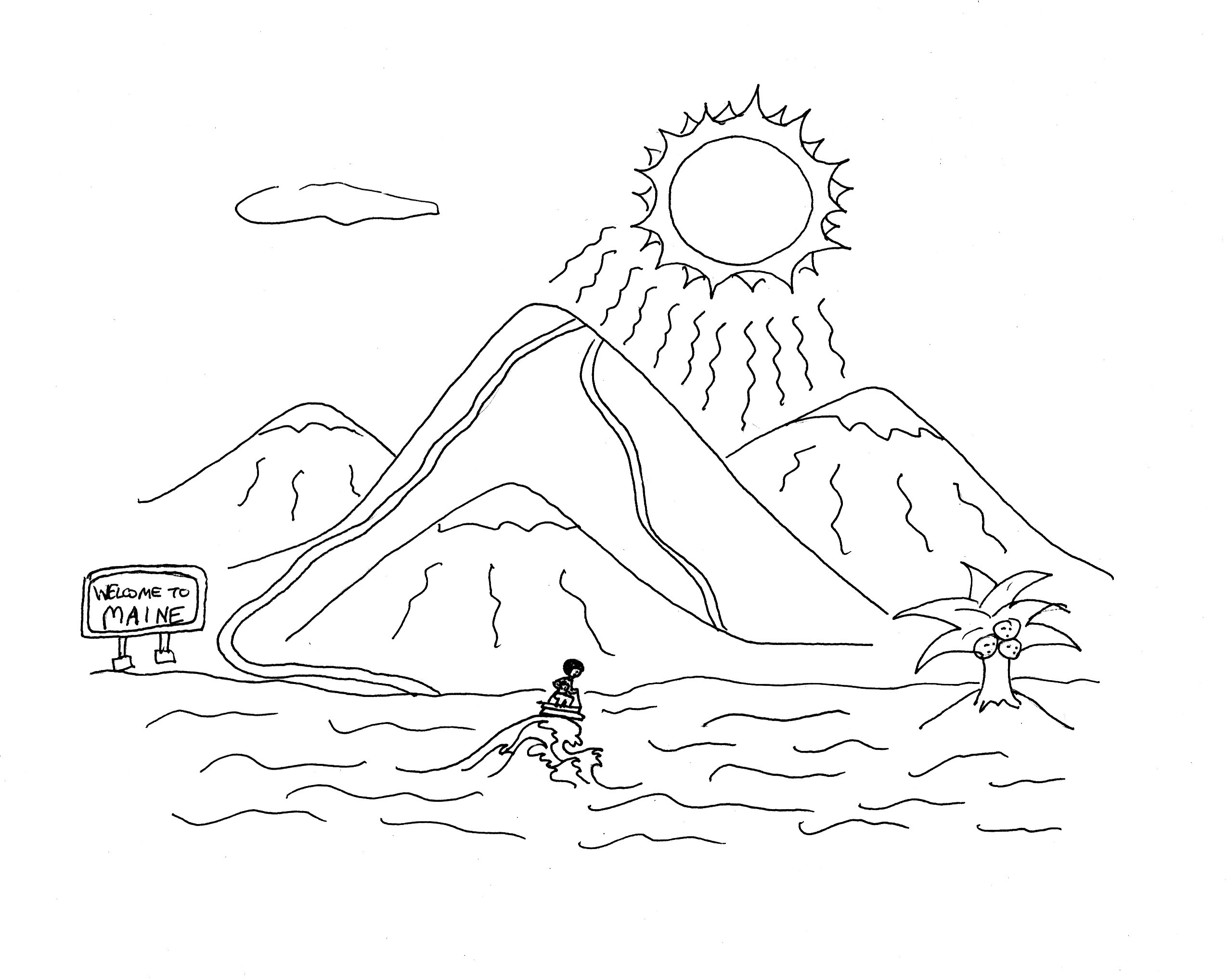Climate change and the future of skiing in Maine
November 30, 2018
 This
piece represents the opinion of the author
.
This
piece represents the opinion of the author
.
 Shona Ortiz
Shona OrtizWinter is officially here in Maine. As I’m writing this, campus and much of the rest of the state are covered with snow, and some places in the north and west have been buried in over a foot. As an avid Nordic skier, I couldn’t be more excited. This Thanksgiving was the first in recent memory where I’ve been able to go skiing on anything more than a manmade loop. I’m sure Alpine skiers are equally thrilled—Sugarloaf and Sunday River, Maine’s largest ski resorts, are calling this whole climatic anomaly “Snowvember” and have most certainly capitalized on the early start to the season.
Yet even as I welcome winter’s arrival, I can’t help but wonder how much longer Maine will see conditions like these. As recent climate reports have indicated, we are dangerously close to provoking catastrophic climate change, and if we fail to reduce our emissions soon, the consequences will be severe. Our state alone could warm as much as five degrees Fahrenheit in the next 50 to 60 years and, according to extreme estimates, could be as hot as Virginia is today. What will this drastic increase in temperature mean for Maine? More specifically, how will it affect our ski industry and culture, which rely on cold, snowy winters?
One of the first consequences of warming will be the loss of small Alpine ski areas. There are dozens of these in Maine, most of which offer a few trails served by a rope tow, T-bar or rusty double chair. Despite their smaller size and lower budget, these ski mountains are fairly popular, as they often charge lower prices for tickets and are usually not very far from towns or cities. However, most are at lower elevations than their larger counterparts, making them more susceptible to change caused by warmer temperatures. In addition, their smaller business models generally rely less on snowmaking and other expensive measures for preserving trails, which will be increasingly necessary in a changing climate. As a result, institutions such as Shawnee Peak, Camden Snow Bowl, Lost Valley and Black Mountain could soon struggle to turn a profit. In turn, as these areas close, Alpine skiing will likely become less accessible to most people, who may not be able to afford the travel and high ticket prices required to ski at resorts like Sugarloaf or Sunday River.
We can also expect that Nordic ski trail networks in Maine will be increasingly inviable in the future. Most of these are also located at lower elevations. However, unlike Alpine areas, many Nordic centers are maintained by municipalities and land trusts and can’t usually support snowmaking over multiple kilometers of trails. In the absence of increased investment, it seems that Nordic skiing in Maine may soon be restricted to only the most developed, high-elevation touring centers and smaller networks may suffer the same fate as smaller Alpine areas.
On top of all this, the environmental impact of skiing will become much greater than it has been in the past. Because of the loss of smaller-scale ski mountains and trail networks throughout the Northeast, many people will elect to drive greater distances to larger resorts such as Sugarloaf with more secure snowpacks. When they arrive, skiers will find mountains and trail systems which will increasingly rely on snowmaking, a process that requires large amounts of water and electricity. In addition, larger crowds may drive these same areas to build new lifts and lodging and to develop new terrain, which will ultimately consume even more resources. This increase in travel and resource consumption will release more greenhouse gases into the atmosphere, worsening the climate upon which these ski areas depend and compounding the problems described above.
The sum of these changes will be a drastic diminishment of skiing culture. Generations of Mainers, inspired by early immigrants from Scandinavia and the Alps, have historically turned to skiing as a way to pass time during our state’s notoriously long and severe winters. Now, it looks like both Alpine and Nordic skiing may be accessible to only the wealthiest among us. And while larger ski resorts and touring centers may see increased traffic, the slow death of local mountains and trail systems may harm our economy as ticket revenue shifts to ski areas run by corporations rather than local businesses.
Maine will be affected in many ways by climate change, from the probable collapse of the lobster industry due to warming oceans, to the agricultural failures caused by droughts, to the loss or severe endangerment of many of our most iconic natural treasures. Skiing is only one part of the picture. Nonetheless, it’s something worth considering the next time you find yourself out enjoying the snow. Our actions have consequences for the future, and all of us—citizens, governments and ski resorts big and small—have the responsibility to act as we are able to stave off climate change’s worst effects. Otherwise, we may irreversibly alter the planet, and in doing so, lose one of Maine’s most enduring activities.

Comments
Before submitting a comment, please review our comment policy. Some key points from the policy: